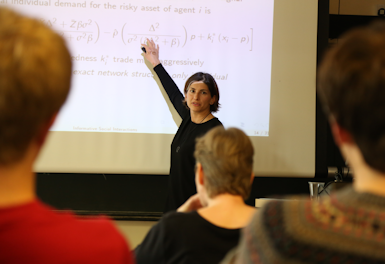
The Advanced Diploma in Economics is a nine month taught course (from the last week in September to the end of June) for students whose first degree contains little or no economics. It provides a qualification equivalent to a second bachelor’s degree in economics and serves two different purposes:
- a preliminary qualification for people wishing to continue advanced education in economics at the master’s level, at the University of Cambridge or elsewhere. Diploma students may therefore apply to continue with the MPhil programme in economics after the Diploma examinations. Continuation is conditional on a good examination performance.
- a stand-alone education for those who want a rigorous introduction to economics and want to complement their existing degree with knowledge of economics but who do not wish to pursue further studies.
Since modern economics makes frequent use of formal (mathematical and statistical) analysis, a good mathematical background is essential for applicants to the Diploma programme. Please see the Entry Requirements section for details of the background required.
Study
To obtain the Advanced Diploma in Economics, students need to:
1. Attend the intensive preparatory course that runs during the last week in September. The aim of the course is to provide an introduction to microeconomics, macroeconomics and econometrics. There is no formal assessment for the preparatory course. In detail:
- In microeconomics, students are introduced to microeconomic issues and problems, including the application of optimisation methods to the analysis of economic behaviour and market outcomes. After completing the course, students should have an understanding of (i) utility maximisation; (ii) comparative statics; (iii) positive and normative analysis; (iv) cost minimisation; (v) profit maximisation; (vi) supply and demand analysis; (vii) market equilibrium; (viii) basics of competitive equilibrium theory and welfare economics.

- In macroeconomics the course focuses on the macro economy as a general equilibrium system and discusses how goods, money and factor markets interact to determine national income and its components. The topics to be covered are: macroeconomic data, the neo-classical model of economic growth, equilibrium unemployment, monetary system, money neutrality and inflation.
- In econometrics there are two components of the course: Probability and Statistics. The Probability component covers probability of events, probability distributions and random variables, bivariate distributions, expectations, convergence concepts, law of large numbers and central limit theorem. For statistics, the course would cover methods of data description, measures of location and dispersion, random sampling, sampling distributions, the concept of an estimator, unbiasedness, consistency, asymptotic normality, confidence intervals, hypothesis testing, scatter plots, correlation and linear regression.
2. Attend and be assessed in three compulsory modules, on microeconomics, macroeconomics and econometrics. These three modules consist of lectures borrowed from the second year of the Economics Tripos, and dedicated Diploma lectures and classes. The lectures given in the Economics Tripos are 40 hours of teaching for Microeconomics, 36 hours for Macroeconomics and 36 hours for Econometrics. The additional dedicated lectures and classes add another 40 hours of teaching in each of the three subjects and cover the following material:
- Paper 1: Microeconomics provides a rigorous foundation of intermediate level microeconomic theory. It forms the basis for further studies in both applied and the theoretical microeconomic at the graduate level. The course introduces important theoretical concepts such as welfare, game theory, choice under uncertainty, information, and behavioural economics.
- Paper 2: Macroeconomics applies a rigorous approach to the study of the behaviour of the economy as a whole. The areas of study to be covered in this course are economies in the short run, open economy macroeconomics including foreign exchange rate fluctuations and macroeconomic policy.
- Paper 3: Econometrics is intended to allow students to confront the theories learnt in the other two papers with observed data. The primary focus of the paper is on random variables and random samples in econometric techniques. Students acquire a basic understanding of the multiple regression model, hypothesis testing, time series; stationary and non-stationary variables; simple diagnostic tests. Practical experience of the application of econometric techniques is an integral part of this paper.
Assessment
Examination of the three Papers will be in May and June.
There is no requirement for Diploma students to remain in Cambridge once they have completed their examinations.
Continuation to MPhil

Continuation to the MPhil in Economics or the MPhil in Finance and Economics is conditional on formally applying for the course and obtaining an average of at least 65% in the Diploma examinations.
Continuation to the MPhil in Economic Research is conditional on formally applying for the course and obtaining an average of at least 70% in the Diploma examinations.
Please see key facts for statistics on continuation to MPhils in recent years.
